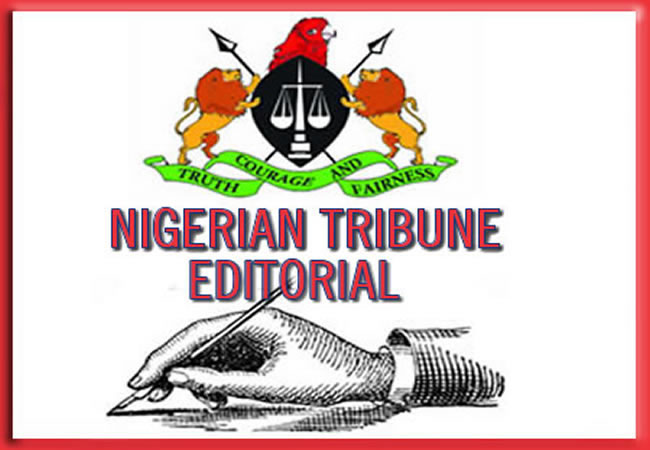EVEN by their lawless standards, Boko Haram terrorists’ execution of 40 people at Gurokayeya village of Geidam Local Government Area of Yobe State last week must rank as one of the most distressing in a democracy. While 20 of the victims were killed on Monday, October 30, by the rampaging gunmen, the other 20 were killed on Tuesday, October 31 through an explosive device suspected to have been planted by the outlaws. According to residents of the affected communities, the sad fate of the victims, who were all farmers, was as a result of their inability to pay taxes imposed by the terrorists on them as a precondition for harvesting their crops. Said a survivor: “The terrorists stormed the village between 5p.m and 6p.m, called out the residents, gathered them on the outskirts, and opened fire on them. Over 17 people died on the spot on Monday. The other 20 were among those who drove from Geidam and neighbouring villages to the affected village for the burial of the first 20, on Tuesday. When they were driving back home, their vehicle ran over an explosive planted by the terrorists; 10 persons died on the spot and another 10 died at the Geidam Primary Healthcare Centre where they were rushed to after the incident.”
Speaking on the incidents, the Yobe State Police Command’s spokesman, Dungus Abdulkarim, said: “The gunmen stormed Gurokayaye village at about 11pm on Monday, October 30 and opened fire, which resulted in the killing of the village head and between 17 and 20 others. Two of those who sustained severe injuries are now receiving treatment at the Geidam PHC and two others now at the Yobe State University Teaching Hospital, Damaturu. At about 7.30 pm of Tuesday, October 31, the people, who had converged on the village for the burial of those killed, drove over a landmine and 20 people died as a result.” Describing the village as a stronghold of Boko Haram which Nigerian troops had even designated a ‘no-go area’, the police image maker said the attacks were reprisals.
He said: “This is harvest time, and the terrorists are used to going around the farming communities, collecting jizya (farm produce tax). Recently they stormed Tarmuwa axis of the state in this tax collection round. Following information revealed by the locals, security agents stormed the locality and engaged the unsuspecting insurgents in a serious gunfire exchange, as a result of which two of the gunmen were killed and four were arrested, as many escaped with gunshot wounds. So, in reprisal, the gunmen descended on Gurokayaye village of Geidam LGA where they killed the people I have just told you.” Penultimate week, troops of Sector 2 of the 233 battalion of Operation Hadin Kai killed six Boko Haram fighters in the state. The troops had responded to distress calls after the terrorists invaded Kurnawa and Bajingo villages. They troops killed four Boko Haram fighters and recovered one AK-47 rifle and two motorcycles, among other items. Then, troops of the 159 Battalion in Jororo village in Geidam Local Government Area of the state, while on patrol, killed two of the Boko Haram tax collectors and recovered two AK-47 rifles and two motorcycles.
To say the very least, last week’s incident in Yobe State is heartrending. It shows that the repeated “assurances” and “reassurances” given by the authorities regarding security in the North-East are mere fiction. If anything, the ease with which the outlaws shed blood, not caring a hoot about the Nigerian State’s recompense, shows that they are an alternative government that will either be rooted out or allowed to take absolute and unchallenged control of vast swathes of Nigerian territory. By its lethargy and diffidence, the Nigerian State has allowed farms to become sites of wanton bloodshed. Farming has become a risky vocation, a passport to Hades simply because that is how the authorities have elected to make things go. This is most unfortunate. The victims believed, tragically as it has now turned out, that the state ought to protect them, and they went about their lawful duties expecting to contribute their quota to Nigeria’s food security. Alas, they were cut down in the most bestial fashion. They died, accused by terrorists of not paying tax, yet they were paying tax to the state government.
The government must wake up and smell the coffee. It has to do much more than it is currently doing to rein in insecurity. Nigeria’s future is imperiled when people cannot even harvest their own crops without fulfilling the satanic demands of terrorists. Insecurity pervades the country, particularly the North-East, and the implication, quite simply, is that the government is not in charge of affairs. Yet, it is the government that has a responsibility to protect life and property. It must act fast before the situation becomes completely irredeemable.
READ ALSO FROM NIGERIAN TRIBUNE
WATCH TOP VIDEOS FROM NIGERIAN TRIBUNE TV
- Let’s Talk About SELF-AWARENESS
- Is Your Confidence Mistaken for Pride? Let’s talk about it
- Is Etiquette About Perfection…Or Just Not Being Rude?
- Top Psychologist Reveal 3 Signs You’re Struggling With Imposter Syndrome
- Do You Pick Up Work-Related Calls at Midnight or Never? Let’s Talk About Boundaries







